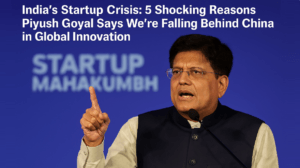India’s Startup Crisis: 5 Shocking Reasons Piyush Goyal Says We’re Falling Behind China in Global Innovation
At the Startup Mahakumbh event, Commerce Minister Piyush Goyal delivered a sharp critique of India’s current startup direction, questioning whether food and grocery delivery apps truly represent the country’s global aspirations. He highlighted the stark difference between Indian and Chinese startups, where the latter are heavily investing in transformative sectors like electric vehicles, semiconductors, robotics, and AI. Goyal expressed concern that many Indian ventures are focused on convenience-based services, often relying on low-cost labor, while Chinese companies are building future-ready technologies.
While acknowledging the success of businesses in quick commerce and social media, he challenged whether such models can compete globally. Using the phrase “Is India’s future just ice cream and cookies?” he emphasized the need for Indian startups to think bigger. Goyal urged entrepreneurs to aim for innovation that solves global problems and enhances India’s economic strength. He stressed that building global-scale businesses—not just convenience apps—is what will define India’s true potential. The speech was a call to action for the startup ecosystem to evolve beyond short-term trends and embrace long-term impact.

India’s Startup Crisis: 5 Shocking Reasons Piyush Goyal Says We’re Falling Behind China in Global Innovation
At the launch of Startup Mahakumbh’s second edition, Commerce Minister Piyush Goyal delivered a powerful message to India’s entrepreneurial community. While applauding the growth of the startup ecosystem, he raised a crucial question: Should India’s brightest minds limit themselves to building food and grocery delivery apps, or strive for groundbreaking innovations that position the country as a global leader?
India vs. China: A Reality Check
Goyal didn’t mince words when comparing India’s startup landscape with China’s. Using a slide titled “India vs. China: The Startup Reality Check,” he pointed out a stark contrast. Chinese startups, he noted, are advancing rapidly in high-impact sectors such as electric vehicles (EVs), semiconductor manufacturing, robotics, and artificial intelligence (AI)—industries with the potential to reshape the global economy and establish economic leadership.
Meanwhile, Indian startups, though successful, remain largely focused on “convenience-driven” sectors—food delivery, quick commerce (ultra-fast delivery of essentials), and social media platforms. While these services meet local demands and generate revenue, Goyal questioned whether they reflect India’s long-term ambitions. “Do we want to create apps that turn unemployed youth into delivery workers for the wealthy, or build technologies that solve global challenges?” he asked.
The Convenience Trap: Short-Term Gains vs. Long-Term Vision
Piyush Goyal acknowledged the role of Indian startups in transforming everyday life. Apps like Swiggy, Zomato, and Blinkit have made ordering food and groceries seamless. However, he warned against mistaking convenience for genuine progress. “These businesses are valuable, but do they represent our ultimate vision for India?” he pressed.
He expressed concern over the economic and social implications of such models. While food delivery platforms generate employment, many of these roles offer low pay and limited upward mobility. In contrast, China’s focus on EVs and semiconductors is creating high-skilled jobs, boosting manufacturing, and positioning the country as a global tech exporter. “China isn’t just serving its own market—it’s dominating global supply chains,” Goyal emphasized.
From Ice Cream to Semiconductors: What Defines India’s Future?
The minister clarified he wasn’t against niche ventures like gourmet food or dessert brands but urged entrepreneurs to reflect on their priorities. “There’s nothing wrong with selling ice cream or cookies,” he said, “but is that what we want to be known for? Shouldn’t our startups aim to solve bigger problems—like energy storage, healthcare access, or climate change?”
He highlighted areas where India has strong potential: clean energy, space tech, AI-driven agriculture, and advanced electronics. For instance, while India’s semiconductor demand is expected to exceed $80 billion by 2026, the country remains heavily reliant on imports. Startups working in chip design or battery technology could significantly reduce this dependency and compete on a global scale.
A Call to Action: Think Big, Build for the World
Goyal’s message was clear—Indian entrepreneurs must move beyond a “small shop” mentality and embrace a global vision. “Why settle for being the third-largest startup ecosystem? Let’s aim to be the best,” he said. This requires founders to focus on genuine innovation, not just incremental improvements. Instead of tweaking existing models, he urged startups to tackle complex problems—such as affordable healthcare, sustainable farming, or next-gen defense systems.
He also highlighted the need for collaboration. Startups, he said, should partner with research institutions, leverage government initiatives like the Production-Linked Incentive (PLI) scheme, and adopt global best practices. “Innovation isn’t just about ideas—it’s about executing them at scale,” he added.
Trade Deals Aren’t Enough: Identity Through Innovation
While India is signing major trade deals to boost exports, Piyush Goyal cautioned that such agreements alone won’t define the country’s economic future. “Our true identity must come from homegrown innovation,” he said. Instead of exporting food delivery models, India should aim to export technologies that set new global benchmarks—such as agricultural drones or AI-powered educational tools.
The Road Ahead
Goyal’s challenge to the startup ecosystem comes at a pivotal time. With over 100 unicorns and a thriving investor base, India’s startup scene has matured. But the next phase of growth demands vision beyond local convenience. As global competition intensifies in AI, clean energy, and advanced manufacturing, Indian startups face a choice: replicate existing ideas or lead with bold, original solutions.
The minister’s speech wasn’t a criticism of success—it was a call for evolution. “Let’s build startups that make India proud—not just profitable, but transformative,” he concluded. The message to founders is loud and clear: the future belongs to those who dare to innovate, not imitate.
You must be logged in to post a comment.